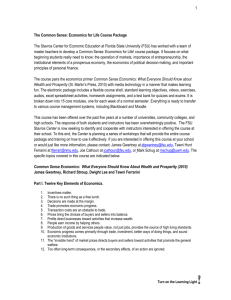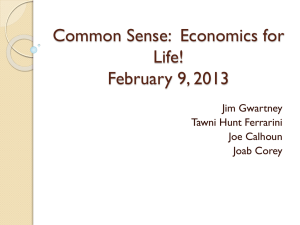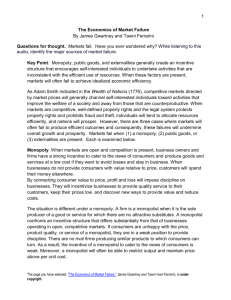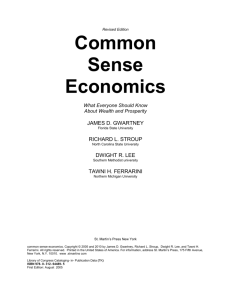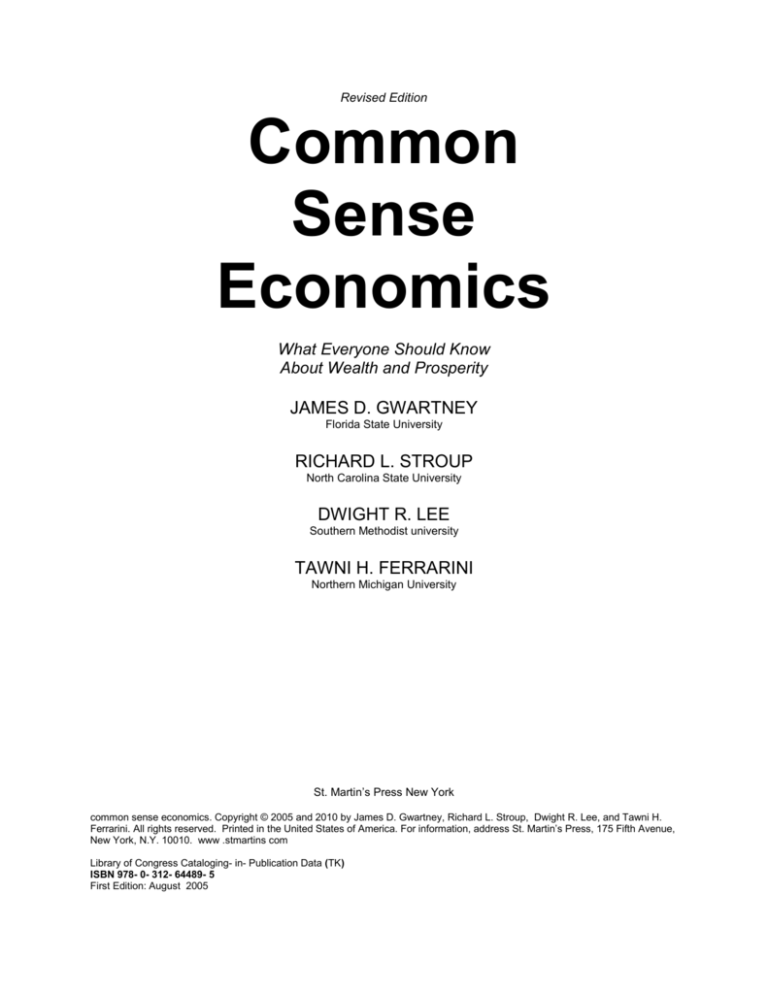
Revised Edition
Common
Sense
Economics
What Everyone Should Know
About Wealth and Prosperity
JAMES D. GWARTNEY
Florida State University
RICHARD L. STROUP
North Carolina State University
DWIGHT R. LEE
Southern Methodist university
TAWNI H. FERRARINI
Northern Michigan University
St. Martin’s Press New York
common sense economics. Copyright © 2005 and 2010 by James D. Gwartney, Richard L. Stroup, Dwight R. Lee, and Tawni H.
Ferrarini. All rights reserved. Printed in the United States of America. For information, address St. Martin’s Press, 175 Fifth Avenue,
New York, N.Y. 10010. www .stmartins com
Library of Congress Cataloging- in- Publication Data (TK)
ISBN 978- 0- 312- 64489- 5
First Edition: August 2005
Part I. Twelve Key Elements of Economics
1. Incentives matter.
2. There is no such thing as a free lunch.
3. Decisions are made at the margin.
4. Trade promotes economic progress.
5. Transaction costs are an obstacle to trade.
6. Prices bring the choices of buyers and sellers into balance.
7. Profits direct businesses toward activities that increase wealth.
8. People earn income by helping others.
9. Production of goods and services people value, not just jobs, provides the source of
high living standards.
10. Economic progress comes primarily through trade, investment, better ways of doing
things, and sound economic institutions.
11. The “invisible hand” of market prices directs buyers and sellers toward activities that
promote the general welfare.
12. Too often long-term consequences, or the secondary effects, of an action are
ignored.
Part II. Seven Major Sources of Economic
Progress
1. Legal system: The foundation for economic progress is a legal system that protects
privately owned property and enforces contracts in an evenhanded manner.
2. Competitive markets: Competition promotes the efficient use of resources and provides
a continuous stimulus for innovative improvements.
3. Limits on government regulation: Regulatory policies that reduce trade also retard
economic progress.
4. An efficient capital market: To realize its potential, a nation must have a mechanism that
channels capital into wealth-creating projects.
5. Monetary stability: A stable monetary policy is essential for the control of inflation,
efficient allocation of investment, and achievement of economic stability.
6. Low tax rates: People will produce more when they are permitted to keep more of what
they earn.
7. Free trade: A nation progresses by selling goods and services that it can produce at a
relatively low cost and buying those that would be costly to produce domestically.
Part III. Economic Progress and the Role
of Government ~ The Ten Elements of
Clear Thinking About Economic
Progress and the Role of Government
1. Government promotes economic progress by protecting the rights of individuals and
supplying a few goods that are difficult to provide through markets.
2. Allocation through political voting is fundamentally different from market allocation, and
economic analysis indicates that the latter is more consistent with economic progress.
3. The costs of government are not only taxes.
4. Unless restrained by constitutional rules, special-interest groups will use the democratic
political process to fleece taxpayers and consumers.
5. Unless restrained by constitutional rules, legislators will run budget deficits and spend
excessively.
6. Government slows economic progress when it becomes heavily involved in providing
favors to some at the expense of others.
7. The net gain to those receiving government transfers is less, and often substantially
less, than the amount they receive.
8. Central planning replaces markets with politics, which wastes resources and retards
economic progress.
9. Competition is just as important in government as in markets.
10. Constitutional rules that bring the political process and sound economics into harmony
will promote economic progress.
Part IV. The Twelve Key Elements of
Practical Finance
1. Discover your comparative advantage.
2. Be entrepreneurial. In a market economy, people get ahead by helping others and
discovering better ways of doing things.
3. Use budgeting to help you save regularly and spend your money more effectively.
4. Don’t finance anything for longer than its useful life.
5. Two ways to get more out of your money: Avoid credit-card debt and consider
purchasing used items.
6. Begin paying into a “real-world” savings account every month.
7. Put the power of compound interest to work for you.
8. Diversify—don’t put all of your eggs in one basket.
9. Indexed equity funds can help you beat the experts without taking excessive risk.
10. Invest in stocks for long-run objectives, but as the need for money approaches, increase
the proportion of bonds.
11. Beware of investment schemes promising high returns with little or no risk.
12. Teach your children how to earn money and spend it wisely.

